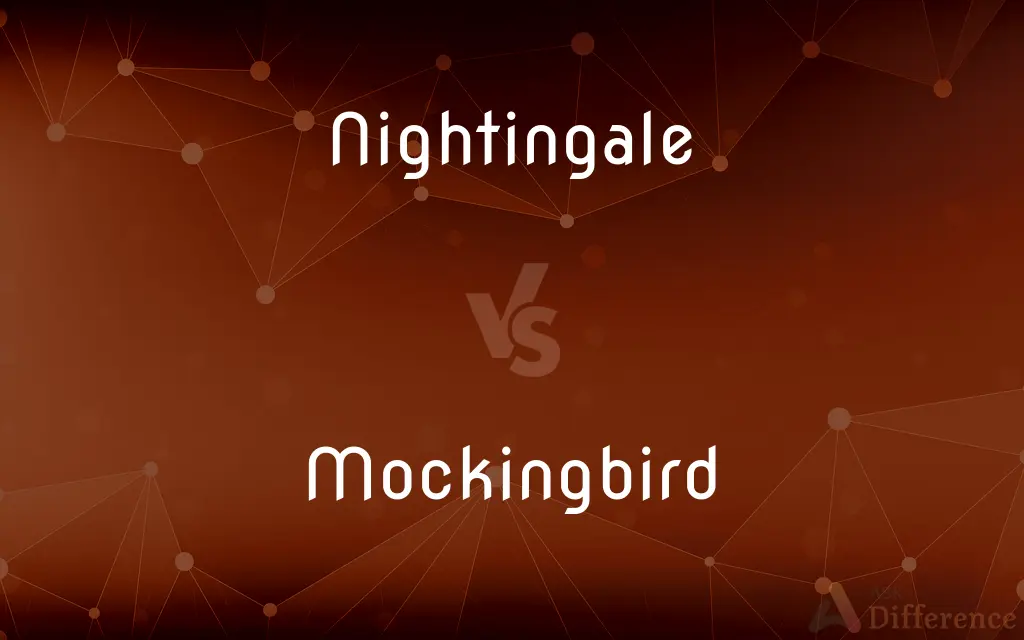Nightingale vs. Mockingbird — What's the Difference?
By Tayyaba Rehman & Urooj Arif — Updated on February 20, 2024
Nightingales are known for their rich, melodious night songs, symbolizing unrequited love in poetry. Mockingbirds, versatile vocalists, mimic sounds from their environment, reflecting adaptability and communication skills.

Difference Between Nightingale and Mockingbird
Table of Contents
ADVERTISEMENT
Key Differences
Nightingales, primarily found in Eurasia, are small, unassuming birds celebrated for their powerful and beautiful song, particularly sung by males at night to attract mates. In contrast, mockingbirds, common in the Americas, are recognized for their ability to mimic a wide range of sounds, from other bird calls to mechanical noises, showcasing their adaptability and complex communication.
The nightingale's song is intrinsic, a natural call that varies little within species, making it a symbol of pure, unadulterated beauty in literature and music. Mockingbirds, however, display an incredible range of learned vocalizations, reflecting their environment and interactions, which can include dozens of different sounds within a single song sequence.
Nightingales are often associated with romantic and poetic imagery, symbolizing love, longing, and the beauty of nature, whereas mockingbirds are symbols of intelligence, adaptability, and even protection, fiercely defending their territory against intruders.
The habitat of the nightingale is typically dense, scrubby woodlands and forests in Europe and Asia, preferring hidden, shaded areas. Mockingbirds, on the other hand, thrive in a variety of environments, from urban to rural areas, adapting easily to human presence and often seen in open landscapes and near dwellings.
Choosing between nightingales and mockingbirds depends on the context of interest: nightingales for their iconic, melodious songs symbolizing beauty and longing, and mockingbirds for their vocal versatility, intelligence, and adaptability.
ADVERTISEMENT
Comparison Chart
Habitat
Eurasia, dense forests
Americas, varied environments
Vocalization
Rich, melodious songs
Mimics diverse sounds
Symbolism
Love, beauty, longing
Intelligence, adaptability
Behavior
Nocturnal singing to attract mates
Aggressive territory defense
Distribution
Limited to Eurasia
Widespread in the Americas
Compare with Definitions
Nightingale
A small bird known for its powerful nocturnal song.
The nightingale's melody filled the quiet night, enchanting all who listened.
Mockingbird
A bird famous for mimicking sounds from its environment.
The mockingbird seamlessly blended the calls of several species into its song.
Nightingale
Found primarily in Eurasia.
The nightingale thrives in the dense forests of Eurasia.
Mockingbird
Common in the Americas.
Mockingbirds are a familiar sight across both urban and rural landscapes in the Americas.
Nightingale
Prefers dense, shrubby environments.
Nightingales nest in the sheltered underbrush, hidden from predators.
Mockingbird
Symbol of adaptability and intelligence.
The mockingbird's ability to mimic complex sounds showcases its cleverness.
Nightingale
Symbol of unrequited love in poetry.
Poets often use the nightingale to represent deep, often unattainable, love.
Mockingbird
Thrives in varied environments, including urban areas.
Unlike many species, mockingbirds have adapted well to city life.
Nightingale
Celebrated in literature and music.
The nightingale has inspired countless works of art with its poignant song.
Mockingbird
Known for aggressive territorial behavior.
Mockingbirds fiercely protect their nests, often chasing away much larger birds.
Nightingale
A Eurasian and African songbird, Luscinia megarhynchos, family Muscicapidae, famed for its beautiful singing at night; a common nightingale.
Nightingales have been spotted in this coppice.
You sing like a nightingale, sport!
Mockingbird
Long-tailed gray-and-white songbird of the southern United States able to mimic songs of other birds
Nightingale
European songbird noted for its melodious nocturnal song
Mockingbird
A long-tailed American songbird of the Mimidae family, noted for its ability to mimic calls of other birds.
Mockingbird
Mockingbirds are a group of New World passerine birds from the family Mimidae. They are best known for the habit of some species mimicking the songs of other birds and the sounds of insects and amphibians, often loudly and in rapid succession.
Common Curiosities
What symbolism is associated with nightingales?
Nightingales symbolize love, beauty, and longing, often featured in literature and music to evoke deep emotional responses.
What makes the nightingale's song unique?
The nightingale's song is unique for its rich, melodious quality and the fact that it is often sung at night, symbolizing beauty and longing.
Can nightingales mimic sounds like mockingbirds?
Nightingales do not mimic sounds to the extent mockingbirds do; their song is more intrinsic and less varied.
Where can you find nightingales and mockingbirds?
Nightingales are found in Eurasia, particularly in dense, wooded areas, while mockingbirds are common in the Americas across a variety of environments.
Do mockingbirds sing at night?
Mockingbirds can sing at any time of day, but they are also known to sing at night, especially under bright urban lights.
Are nightingales nocturnal?
Yes, nightingales are particularly known for their nocturnal singing, which males use to attract mates.
How do nightingales and mockingbirds differ in their nesting habits?
Nightingales prefer dense, hidden areas for nesting, while mockingbirds are more flexible, often nesting in open or human-modified landscapes.
How do mockingbirds defend their territory?
Mockingbirds defend their territory aggressively, not hesitating to attack larger birds or even humans if they feel threatened.
How do mockingbirds communicate?
Mockingbirds communicate through a complex array of vocalizations, including mimicked sounds, to interact with their environment and other birds.
Why are mockingbirds known for mimicry?
Mockingbirds are known for their ability to mimic a wide range of sounds, from other bird calls to mechanical noises, showcasing their vocal versatility.
What is the significance of the mockingbird in literature?
In literature, the mockingbird often symbolizes innocence, intelligence, and adaptability, sometimes used to highlight social themes.
Is the nightingale's song learned or innate?
The nightingale's song is largely innate, with minimal variation within species, focusing on natural calls.
What role do nightingales and mockingbirds play in their ecosystems?
Both play significant roles in their ecosystems, including controlling insect populations and contributing to the soundscape, but their specific roles can vary due to their different habitats and behaviors.
Why are nightingales less visible compared to mockingbirds?
Nightingales are more reclusive, preferring dense, shrubby areas to hide, while mockingbirds are more adaptable and can thrive in open and urban areas, making them more visible.
Can mockingbirds mimic human-made sounds?
Yes, mockingbirds can mimic human-made sounds, including car alarms and machinery, reflecting their adaptability.
Share Your Discovery

Previous Comparison
Output vs. Throughput
Next Comparison
Sage vs. SiegeAuthor Spotlight
Written by
Tayyaba RehmanTayyaba Rehman is a distinguished writer, currently serving as a primary contributor to askdifference.com. As a researcher in semantics and etymology, Tayyaba's passion for the complexity of languages and their distinctions has found a perfect home on the platform. Tayyaba delves into the intricacies of language, distinguishing between commonly confused words and phrases, thereby providing clarity for readers worldwide.
Co-written by
Urooj ArifUrooj is a skilled content writer at Ask Difference, known for her exceptional ability to simplify complex topics into engaging and informative content. With a passion for research and a flair for clear, concise writing, she consistently delivers articles that resonate with our diverse audience.















































